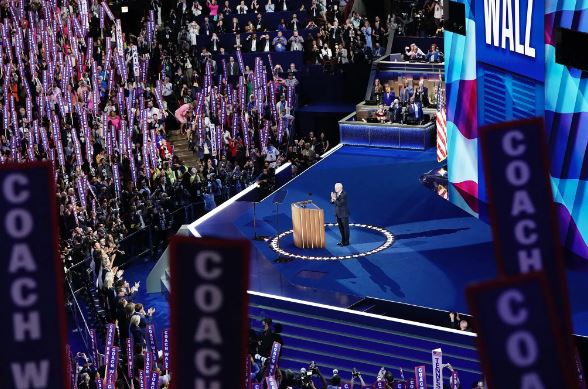In a pivotal address at the Democratic National Convention in Chicago, Governor Tim Walz of Minnesota accepted the vice-presidential nomination, presenting himself as a bridge to disillusioned Americans who view the Democratic Party as a bastion of coastal elitism. Walz, a figure rooted in Midwestern values, used the opportunity to showcase his journey from a little-known governor to a prominent party figure, emphasizing his commitment to pragmatism and patriotism.
“We’re all here tonight for one beautiful, simple reason: We love this country,” Walz declared, striking a tone of unity and national pride. A month ago, few Americans outside Minnesota knew much about Walz, except for some engaged Democrats who appreciated his sharp critiques of Republicans, whom he humorously labeled “weird.” However, as he delivered the most significant speech of his career, it was clear that attendees had quickly familiarized themselves with his life story, including his background as a former high school football coach.
Convention organizers capitalized on this identity, distributing signs that read “Coach Walz,” while a group of his former players, now middle-aged, marched onto the stage to their high school fight song. Chants of “Coach” echoed throughout the venue as Walz peppered his speech with football metaphors. “It’s the fourth quarter. We’re down a field goal,” he said.
Walz’s folksy approach and emphasis on teamwork and common sense resonated deeply with the audience, highlighting why Democrats hope he can help stem their losses with rural and white working-class voters, particularly men. His remarks focused more on his football coaching career than his 12 years in Congress, where he represented a largely rural and conservative district in southern Minnesota.
Senator Amy Klobuchar of Minnesota underscored this appeal, saying, “Who better to take on the price of gas than a guy who could pull over to help change your tire? Who better to find common ground than a guy with Midwestern common sense?” This portrayal of Walz as a relatable, everyman figure is central to the Democratic strategy of reconnecting with voters who have grown increasingly hostile to the party.
The convention also provided a glimpse into Walz’s personal life. His wife, Gwen Walz, who gained attention for her expressive reactions during speeches, narrated a video introducing her husband.
Walz’s career began as a culturally conservative Democrat on issues like guns, but over time, he evolved into a liberal favorite. His first term as governor was marked by consensus-building with Republicans in the State Legislature, but after Democrats gained majorities in 2022, he pushed through a sweeping liberal agenda. “While other states were banning books from their schools, we were banishing hunger from ours,” Walz said, referencing a bill he signed that allowed public schools to provide free breakfast and lunch to all students.
Despite this shift to more progressive policies, Walz continues to speak the language of small-town America. His walk-on music, John Mellencamp’s “Small Town,” underscored his connection to his rural roots. Walz, a graduate of Chadron State College in Nebraska, has also taken pride in turning charges of elitism against Republicans.
Throughout his speech, Walz employed patriotic language, aligning himself with traditional American values like freedom and liberty. He criticized former President Donald Trump’s agenda as serving only “the richest and the most extreme amongst us,” and called for a change in leadership.
As he wrapped up his address, Walz’s emphasis on neighborliness, pragmatism, and patriotism left a lasting impression, positioning him as a key figure in the Democratic Party’s effort to reconnect with disillusioned voters across the country.

